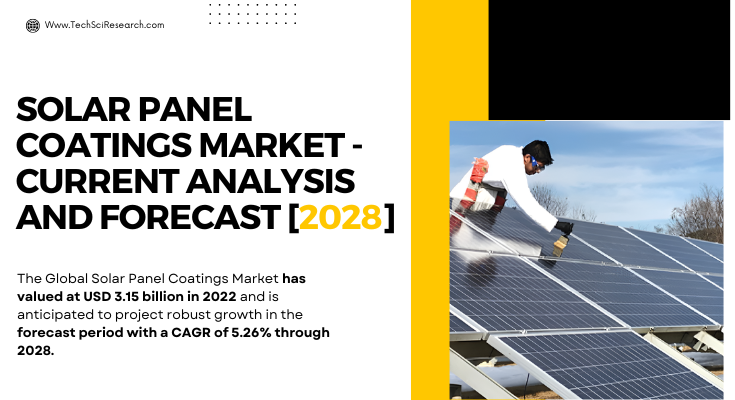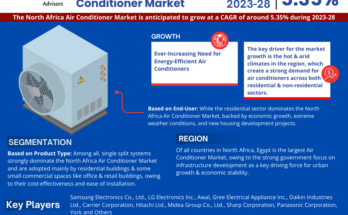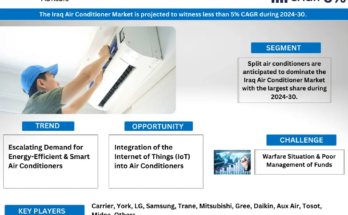According to TechSci Research report, “Solar Panel Coatings Market – Global Industry Size, Share, Trends, Competition Forecast & Opportunities, 2028”, the Global Solar Panel Coatings Market stood at USD 3.15 billion in 2022 and is anticipated to grow with a CAGR of 5.26% in the forecast period, 2023-2028. The initiatives taken by the government based on Solar Panel Coatings has led to favorable market conditions for the Global Solar Panel Coatings Market. Several factors contribute to the growth of various Solar Panel Coatings products.
Governments worldwide are recognizing the importance of solar energy and are taking initiatives to promote the use of solar panel coatings. These coatings play a crucial role in enhancing the efficiency and durability of solar panels, making them more reliable and cost-effective in harnessing renewable energy.
High-Temperature Solar Selective Coating Development for Power Tower Receivers: This groundbreaking project, funded by the U.S. Department of Energy (DOE), aims to develop high-temperature solar selective coatings specifically designed for power tower receivers. By optimizing the coating materials and structure, the project seeks to maximize solar energy absorption while minimizing heat loss, thereby significantly improving the overall performance of power tower systems.
Another notable initiative by the DOE is focused on developing low-cost self-cleaning reflector coatings for Concentrated Solar Power (CSP) collectors. These coatings aim to address one of the key challenges in maintaining the efficiency of CSP systems – the accumulation of dust and dirt on the reflector surfaces. By integrating innovative self-cleaning properties into the coatings, the goal is to reduce cleaning time and costs, ensuring the long-term cost-effectiveness of solar power generation.
Swift Coat, a pioneering company specializing in nanocoating technology, has secured a significant milestone in the field of solar energy. With a $1 million grant from the DOE, Swift Coat is at the forefront of developing a revolutionary solar glass coating. This cutting-edge coating combines industry-standard anti-reflective properties with a dirt-repelling (or “dirt-eating”) feature. This unique combination not only enhances light transmission and energy absorption but also helps maintain the efficiency of solar panels by minimizing the accumulation of dirt and debris. Such advancements in solar panel coatings are poised to revolutionize the industry and further propel the adoption of clean and sustainable energy sources.
The solar panel coatings industry has witnessed remarkable innovation and progress in recent years. These technological advancements have paved the way for the development of highly efficient and long-lasting products. One such breakthrough is the introduction of advanced anti-reflective coatings, which work wonders by significantly increasing the amount of sunlight that solar panels can absorb. This enhanced light absorption directly translates into improved energy conversion efficiency, ultimately maximizing the overall performance of the solar panels.
Additionally, the integration of self-cleaning coatings has revolutionized the maintenance and longevity of solar panels. These coatings are designed to prevent the accumulation of dust and dirt on the surface of the panels. By doing so, they ensure that sunlight can reach the photovoltaic cells without any hindrance, thus minimizing any potential loss in power generation. This self-cleaning feature not only helps in maintaining the efficiency of the panels but also reduces the need for frequent manual cleaning, making solar energy more hassle-free and cost-effective in the long run.
Overall, these advancements in solar panel coatings have not only enhanced their efficiency and durability but have also contributed to making solar energy a more viable and sustainable option for meeting our ever-growing energy needs.
Browse over XX market data Figures spread through XX Pages and an in-depth TOC on the “Solar Panel Coatings Market” @ https://www.techsciresearch.com/report/solar-panel-coatings-market/4154.html
The Global Solar Panel Coatings Market is segmented into type, end user, regional distribution, and company.
Based on its end user, the residential segment held the largest share in the market. The use of solar panel coatings in residential applications is expected to witness significant growth during the forecast period. With the increasing adoption of photovoltaic systems on rooftops of various commercial and residential buildings, such as hotels, hospitals, schools, and offices, there arises a plethora of opportunities for market players operating in this business segment. These coatings offer numerous benefits, including the reduction of energy demands on air conditioning units, thereby contributing to energy efficiency in buildings.
Moreover, they also help in reducing glare, providing a comfortable environment for occupants. Additionally, the coatings exhibit enhanced resistance to dirt accumulation, ensuring optimal performance of the solar panels over an extended period. With these advantages, the demand for solar panel coatings is poised to rise as more and more consumers recognize the value, they bring to both residential and commercial applications.
Based on region, Asia Pacific segment is expected to grow during the forecast period.
In the Asia Pacific region, the solar panel coatings market is experiencing robust growth due to the surging demand for renewable energy sources. This demand is driven by the increasing adoption of solar panels in both commercial and residential sectors, as well as the growing awareness among consumers about the need for environmental protection. As governments and organizations continue to prioritize sustainable energy solutions, the solar panel coatings market is poised for further expansion in the region. With advancements in technology and a focus on improving energy efficiency, solar panel coatings play a crucial role in maximizing the performance and longevity of solar panels, making them an indispensable component in the pursuit of a greener future.
Major companies operating in the Global Solar Panel Coatings Market are:
- AKREMA SA
- Advance Nanotech, Inc.,
- DIAMON-FUSION INTERNATIONAL INC.
- FENZI SPA
- KONINKLIJE DSM N.V
- Nanomason Inc.
- NANOPOOL GMBH
- UNELKO CORPORATION
- 3M Co.
- PPG Industries Inc
Download Free Sample Report @ https://www.techsciresearch.com/sample-report.aspx?cid=4154
Customers can also request for 10% free customization on this report.
“Growing application of Solar Panel Coatings in various end-user industries are key drivers of the Solar Panel Coatings Market. Growth in the competitive landscape and the presence of well-established companies in the market who are dedicated to enhancing their productivity of Solar Panel Coatings with every passing year are anticipated to register an impressive growth to Global Solar Panel Coatings Market in the forecast period.,” said Mr. Karan Chechi, Research Director with TechSci Research, a research-based management consulting firm.
“Solar Panel Coatings Market – Global Industry Size, Share, Trends, Opportunity, and Forecast, Segmented By Type (Anti-Reflective, Hydrophobic, Self-Cleansing, Anti-Soiling, Anti-Abrasion, Others), By End User (Residential, Commercial, Energy, Agriculture, Automotive, Others), By Region and Competition”, has evaluated the future growth potential of Global Solar Panel Coatings Market and provides statistics & information on market size, structure, and future market growth. The report intends to provide cutting-edge market intelligence and help decision makers take sound investment decisions. Besides, the report also identifies and analyzes the emerging trends along with essential drivers, challenges, and opportunities in the Global Solar Panel Coatings Market.
You may also read:
Long Fibre Thermoplastics (LFT) Market Detailed Analysis of Share, Growth [2028]
Expanded Polypropylene Foam Market Set for X.XX% CAGR Through 2028- Forecasted Growth
Packaging Testing Market Detailed Analysis of Share, Growth [2028]
Flexible Plastic Packaging Coating Market on the Rise [2028]- Driving Growth
Impact Modifier Market Trends [2028]- Exploring the Dynamics of Industry
Table of Content-Solar Panel Coatings Market
- Product Overview
1.1. Market Definition
1.2. Scope of the Market
1.2.1. Markets Covered
1.2.2. Years Considered for Study
1.2.3. Key Market Segmentations
- Research Methodology
2.1. Objective of the Study
2.2. Baseline Methodology
2.3. Key Industry Partners
2.4. Major Association and Secondary Sources
2.5. Forecasting Methodology
2.6. Data Triangulation & Validation
2.7. Assumptions and Limitations
- Executive Summary
3.1. Overview of the Market
3.2. Overview of Key Market Segmentations
3.3. Overview of Key Market Players
3.4. Overview of Key Regions/Countries
3.5. Overview of Market Drivers, Challenges, Trends
- Global Solar Panel Coatings Market Outlook
4.1. Market Size & Forecast
4.1.1. By Value
4.2. Market Share & Forecast
4.2.1. By Type (Anti-Reflective, Hydrophobic, Self-Cleansing, Anti-Soiling, Anti-Abrasion, Others)
4.2.2. By End User (Residential, Commercial, Energy, Agriculture, Automotive, Others)
4.2.3. By Region
4.2.4. By Company (2022)
4.3. Market Map
4.3.1. By Type
4.3.2. By End User
4.3.3. By Region
- Asia Pacific Solar Panel Coatings Market Outlook
5.1. Market Size & Forecast
5.1.1. By Value
5.2. Market Share & Forecast
5.2.1. By Type
5.2.2. By End User
5.2.3. By Country
5.3. Asia Pacific: Country Analysis
5.3.1. China Solar Panel Coatings Market Outlook
5.3.1.1. Market Size & Forecast
5.3.1.1.1. By Value
5.3.1.2. Market Share & Forecast
5.3.1.2.1. By Type
5.3.1.2.2. By End User
5.3.2. India Solar Panel Coatings Market Outlook
5.3.2.1. Market Size & Forecast
5.3.2.1.1. By Value
5.3.2.2. Market Share & Forecast
5.3.2.2.1. By Type
5.3.2.2.2. By End User
5.3.3. Australia Solar Panel Coatings Market Outlook
5.3.3.1. Market Size & Forecast
5.3.3.1.1. By Value
5.3.3.2. Market Share & Forecast
5.3.3.2.1. By Type
5.3.3.2.2. By End User
5.3.4. Japan Solar Panel Coatings Market Outlook
5.3.4.1. Market Size & Forecast
5.3.4.1.1. By Value
5.3.4.2. Market Share & Forecast
5.3.4.2.1. By Type
5.3.4.2.2. By End User




